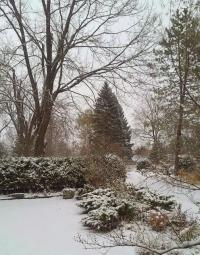|
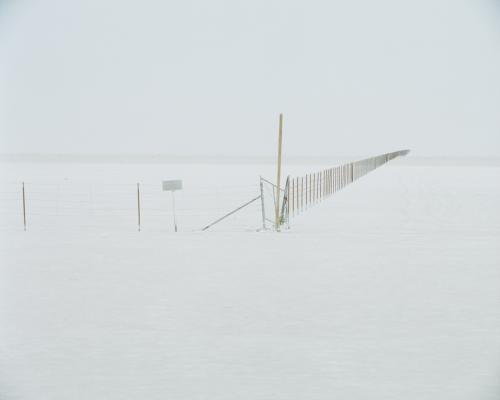
Floating Island
Utah/Nevada
2011-14
Mike Osborne Floating Island: A Conversation With Mike Osborne
The Great Leap Sideways
_______________________
Five poems by Jules Supervielle
(1884-1960)
Translations by Ian Seed
the Fortnightly Review
In a Foreign Country
Have these faces come from my memory
and have these gestures touched earth, or sky?
Is this man alive as he seems to believe
with his voice, and this smoke on his lips?
Chairs, tables, unfeeling wood, you I can touch
in this snowy country whose language I do not know.
Stove, with your warmth whispering to my hands,
who is this man before you who resembles me
even in my past, knowing what I think,
touching when I touch you and filling my silence,
who then rises, opens the door, and disappears,
leaving this emptiness behind where I have no place.
...(more)
_______________________
The Invention of Clumsiness
Alexi Worth
cabinet
One afternoon in May of 1853, the painter Eugène Delacroix went for a walk in the forest with two old friends. As they walked, the three men returned to topics they had discussed before: questions of spontaneity, how finished pictures are “always somewhat spoiled” compared to sketches. Together they admired a famous oak tree. They talked about Racine. Then they went back to Delacroix’s house for dinner. After the meal, Delacroix later recalled, “I made them try the experiment which I had done myself, without planning it, two days before.” The experiment was simple. First, he passed around a set of unusual pictures, photographic calotypes that Eugène Durieu, a pioneer in the new medium of photography, had taken at his request.1 In these small amber images, a naked man and woman appeared—sometimes alone, sometimes together; sitting, standing, or kneeling; often staring warily back at the lens. The naked couple are memorable to posterity, because they were among the first humans to be photographed without clothes. If they weren’t the Adam and Eve of photographic nakedness, they were among the earliest citizens of that now fairly populous realm. But they didn’t beguile or even impress the great painter and his companions. ...(more)
_______________________
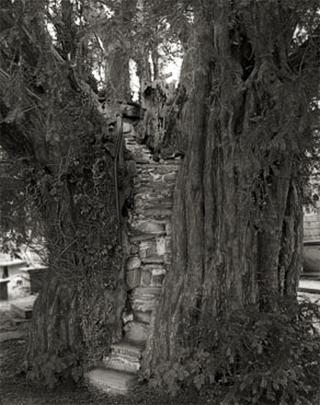 The Nantglyn Pulpit Yew
Beth Moon
Portraits of Time: Ancient Trees
Photographs and text by
Beth Moon
lens culture
via Nag on the Lake
_______________________
habitus
Dan Disney
Meanjin
a few still go the root of the thing, where
(inherited by trance) memory is a secret doctrine; logic works
at higher levels of consciousness
but dressed in the divine uniforms of victimhood, the pre-rational
licks yet at the edge of each battle
for paradise. Few there go to the root of things
where behaviour is an arrangement of
primitive wandering, paradoxical as cililization. ...
...(more)
_______________________
A Decent Interval
Greg Siegel
cabinet
How long does a building stand before it falls?
How long does a contract last? How long will brothers share the inheritance before they quarrel?
How long does hatred, for that matter, last?
Time after time the river has risen and flooded.
The insect leaves the cocoon to live but a minute.
How long is the eye able to look at the sun?
From the very beginning nothing at all has lasted.
—Gilgamesh
I.
Galileo taught mathematics at the University of Pisa from 1589 to 1592, and sometime during this period he mounted a dramatic public demonstration of one of his more unorthodox notions. Clutching two lead spheres of different sizes and masses, he climbed the stairs of the campanile, the bell tower in the Piazza del Duomo, behind the cathedral. The young professor then proceeded—before an assembly of expectant onlookers, many of them faculty and students from the university—to drop the test objects simultaneously from the upper balcony. The plummeting orbs reached the ground together; with no temporal interval between their terrestrial impacts, a single resounding thump announced their coincident landing. Aristotelian physics, for ages the dominant paradigm, held that the velocities of free-falling bodies moving through the same medium vary in direct proportion to their weights. Galileo’s so-called Leaning Tower of Pisa Experiment conclusively disproved Aristotle’s doctrine of natural downward motion: heavier objects do not fall to earth faster than lighter objects, after all. In a veritable instant, the old certainties, all those dusty apriorisms of ancient and medieval inheritance, were upended. Science and knowledge had at last entered the modern era.
...(more)
_______________________
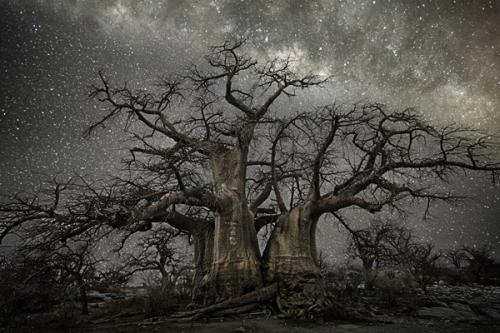
Beth Moon
_______________________
Contemporaries and Snobs
Laura Riding
Edited by Laura Heffernan and Jane Malcolm
reviewed by
Prathna Lor
lemon hound
(....)
Writing just over 85 years before our own critical junctures of poetic production in an age of technological prowess, self-publishing, buy-in anthologies, digital poetics, machinic reading, reading machines, and information recycling—speaking largely to persistent anxieties about hermeneutics, authorial integrity, and textual production—Riding’s critical commentaries about poetry during her own time unsurprisingly reverberate with our own contemporary concerns.
In their introduction to Contemporaries Laura Heffernan and Jane Malcolm argue that Riding “offers a counter history of the idiosyncratic, of what the institution of modernism left (and leaves) behind […] champion[ing] the non-canonical, the ‘barbaric,’ and the under-theorized”. ...
(....)
In retrospect, Riding’s work seems to anticipate not only feminist but sociological, new historical, cultural materialist, and critical paradigms. Indeed, Riding had been attuned to the social and historical forces that were effecting poetry during her time—what she calls “historical effort”; perhaps a lone voice, yet unfortunately forgotten as modernist criticism attempted to celebrate the so-called “genius” of high modernism, which, as increasing scholarship has shown, was merely the textual products of those who knew who to know and knew how to know them. Such a paradigmatic shift in modernist studies is noted in the shift from Modernism to modernisms—attending to forgotten or lost texts, neglected texts, writers of colour, women writers, international modernisms, along with the necessary intersectional praxis of race, gender, and sexual relations within an Anglo-American and global context.
...(more)

Porte d'Arcueil
1918
Tsuguharu Foujita
b. November 27, 1886
_______________________
Cinema of the Present by Lisa Robertson
reviewed by Ella Longpre
entropy
Lisa Robertson’s works inhabit the charged space between poetic intricacy and essayistic inquiry. A slight shuddering movement between forms can be tracked from work to work, from the hybrid-creature Xeclogue, to the poetry collection Magenta Soul Whip, and then up to the essays—the aporias—of Nilling. This characteristic oscillation of form can be distilled, too, from line to line: a statement questions while it revives; it can be read as a note on the archaeology of address, or recited as an ode. But if the ode wore velvet, or some other provocative material, such as resin.
Robertson’s most recent book, Cinema of the Present, is a collection of such statements, donned in a satin cape.
...(more)
_______________________
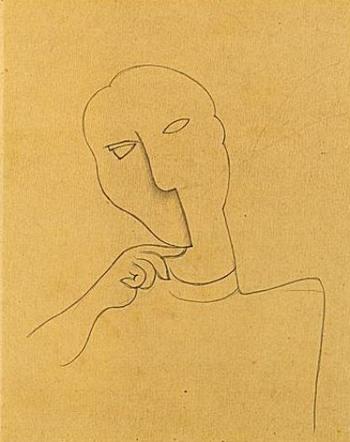 portrait arabesque
Roger de La Fresnaye
d. 27 November 1925
_______________________
Amish Trivedi: 'A Thousand Years of Staring I – VIII,' with a note on permutational art
[Extracted from Amish Trivedi's Your Relationship to Motion Has Changed, a work in progress]
presented by Jerome Rothenberg
(....)
VIII.
We imagine death as God looking back at us
from an abyss we’ve reached into, but nerves
don’t stop firing right at the last signal: they
fire as they degrade into soil or immolation
clears us. These sensations are just body
fighting evolutionary return. As we begin
again, we see adoration and want it to be
every day, but you end up nostalgic for
silence.
...(more)
_______________________
 magician
Roger de La Fresnaye
_______________________
Your Relationship to Motion Has Changed
Amish Trivedi
Having nowhere to go
is the best place to be: I
don’t care if crosswalk signals
never let me pass or if rivers
continue to flood. After all terrors,
settled moments have left to
head towards nothing. Welcome to
mediocrity: we’ve had a table
with a broken leg for you
all along. As another immolation
passes, we see renewed faith in
saints who died normal deaths, poets
who had heart attacks
in their 80s
surrounded by their families. Ev-
entually you have to accept
that things you knew
about motion are long since
debunked and re-mystified
in new ways. ...
...(more)
_______________________

Roger de La Fresnaye
_______________________
The Medium of the English Language
James Longenbach
Poetry Magazine
(....)
The satisfaction of art may consequently be found in a poached egg or a child’s speech, but I suspect that we’re most often moved to call a work of art great when we feel the full capacity of the medium at play, nothing suppressed, as if the artist’s command of the medium and the long history of the medium’s deployment by previous artists were coterminous — which, in a sense, they are.
It is for Shakespeare’s power of constitutive speech quite as if he had swum into our ken with it from another planet, gathering it up there, in its wealth, as something antecedent to the occasion and the need, and if possible quite in excess of them; something that was to make of our poor world a great flat table for receiving the glitter and clink of outpoured treasure. The idea and the motive are more often than not so smothered in it that they scarce know themselves, and the resources of such a style, the provision of images, emblems, energies of every sort, laid up in advance, affects us as the storehouse of a kind before a famine or a siege?—?which not only, by its scale, braves depletion or exhaustion, but bursts, through mere excess of quantity or presence, out of all doors and windows.
These two sentences by Henry James enact the Shakespearean work they describe: they overwhelm us with a feeling of an unstoppable excess that’s registered in rhythm, sonic echo, syntax, and, most fundamentally, diction. The strategic juxtaposition of Germanic and Latinate words is as immediately apparent here (“constitutive speech,” “great flat table,” “the occasion and the need”) as it is in Shakespeare, and at the end of each sentence this strategy is raised to virtuosic heights with phrases that revel in the collision of Germanic bluntness and Latinate elaboration: “the glitter and clink of outpoured treasure,” the “mere excess of quantity or presence, out of all doors and windows.”
These sentences sound like James, but by performing the action, they describe, the sentences also imply that linguistic virtuosity in Modern English is in some indelible way Shakespearean, and the implication, though easily abused, is not merely sentimental. Shakespeare was a powerful writer who in his lifetime was poised at exactly the right moment to take advantage of the medium that the English language had only recently become. He could reach for effects that had been unavailable to the poets of both “The Seafarer” and The Canterbury Tales, and because of the particular power with which he did so, poems we think of as great, poems that harness the full capacity of the medium, tend to sound to us Shakespearean. But what we are really hearing in such poems is the medium at work; what we are hearing is the effort of a particular writer to reach for the effects that Modern English most vigorously enables. The polyglot diction of a phrase like John Ashbery’s “traditional surprise banquet of braised goat” feels idiosyncratic because it is also conventional, empowered by its author’s intimacy with his medium.
...(more)
via the page
_______________________
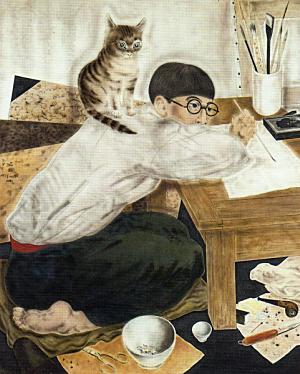
self portrait
Tsuguharu Foujita

photo - mw
_______________________
Clearings, Iceholes, Other Abodes: Dorothea Grünzweig
translated from the German by Derk Wynand
Malahat Review
I
The way that jets, tempests, or fireworks, captured on paper by an adult child I know, get the fear of them off his back, arrest it—so do the words of poetry act as detention centres, repositories into which fear is thrust, to serve time there.
So if the adult child is distraught, one needs to recite poems to him, make up melodies in which they are wrapped and sing them. He sings along, grows calm, just as he grows calm after wild, erratic joy once the joyrousers slip into small shapes on the page, or laugh out and beckon from a poem.
When I think about poems, that’s the first thing which occurs to me: Writing, reciting them is a way to dispel anxiety. Freefloating anxiety is put in chains–that is, protectively–is temporarily housed in verbal abodes. The same could be said of grief, pain or giddy enthusiasm.
And when I think about poems, a hole appears in the winter lake’s ice. Diving into the icehole. With a despondent or overheated mind down into the water. Whatever works against stability is surrendered to it. It stays there, even as one rises to the surface oneself, tensed and light.
...(more)
via the page
_______________________
Poetry - I too dislike translating it.
Toward a poetics of versioneering.
Dan Disney
Abstract:
Don Paterson's Orpheus – a version of Rilke (2006) is an English-language text which transmutes Rilke's original Die Sonette an Orpheus (1922); this is a text which sets up exemplary modes of production for poet-versioneers. Re-reading Marianne Moore's poem, 'Poetry', as enshrining affectivity as no less than categorical and generic, this paper agrees with Paterson's impulse to abandon the imperative for equivalence when translating poems by instead seeking to transmute (as Paterson puts it) the 'spirit of the original' source text. Re-reading sound as the echo of a poem's spirit, I speculate that versioneering requires close listening paired to a range of creative strategies (ekphrasis, techne, poeisis). This paper explores these processes through an examination of my own English-language versions of poems by Italian poet Alda Merini – versions which seek to capture and transmute the implication-filled sounds of the source texts.
_______________________
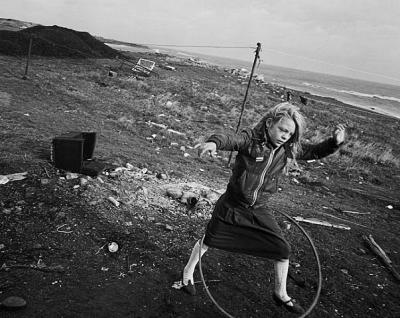
Helen and Hula-Hoop
Seacoal Beach,
Lynemouth, Tyneside, UK
Chris Killip
1984
_______________________
Autumn
P.K. Page
Whoever has no house now will never have one.
Whoever is alone will stay alone
Will sit, read, write long letters through the evening
And wander on the boulevards, up and down...
Autumn Day
Rainer Maria Rilke
Its stain is everywhere.
The sharpening air
of late afternoon
is now the colour of tea.
Once-glycerined green leaves
burned by a summer sun
are brittle and ochre.
Night enters day like a thief.
And children fear that the beautiful daylight has gone.
Whoever has no house now will never have one.
(....)
Even though there is bounty, a full harvest
that sharp sweetness in the tea-stained air
is reserved for those who have made a straw
fine as a hair to suck it through-
fine as a golden hair.
Wearing a smile or a frown
God's face is always there.
It is up to you
if you take your wintry restlessness into the town
and wander on the boulevards, up and down.
...(more)
_______________________
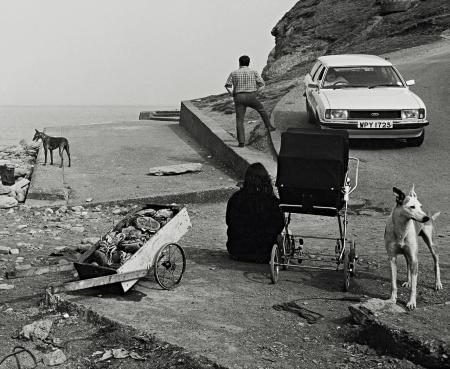
Crabs and People
Skinningrove, North Yorkshire
Chris Killip
1981 _______________________
Remembering
P. K. Page
Remembering you and reviewing
our structural love
the past re-arises alive
from its smothering dust.
For memory, which is only decadent
in hands like a miser’s
loving the thing for its thingness,
or in the eyes of collectors who assess
the size, the incredible size, of their collection,
can, in the living head, create and make
new the sometimes appallingly ancient present
and sting the sleeping thing
to a sudden seeing.
And as a tree with all its leaves relaxed
can shiver at the memory of wind
or the still waters of a pool recall
their springing origin and rise and fall
suddenly over the encircling basin’s lip—
so I, remembering from now to then,
can know and see and feel again, as jewels
must when held in a brilliant branch of sun.
_______________________
Journey with No Maps: A Life of P.K. Page
Sandra Djwa
Reviewed by Tina Northrup
Antigonish Review
(....)
In her Life of P.K. Page, Djwa represents the young Pat Page as “a new type — not a suffragette, not a twenties flapper, but a modern woman in embryo.” Page appears, in other words, as a sharp, sensible, and sensitive New Woman, prepared to launch herself into the unknown. In her preface to the book, Djwa notes that, “[f]or a woman born near the start of the twentieth century, life was a journey with no maps because so much changed during her lifetime — the right to vote, to gain higher education, to pursue a career or to marry, and, if married, to choose whether to have children.” Accordingly, this biography emphasizes its subject’s curiosity and openness to the world. The woman who emerges from its pages is one who was willing to follow her life wherever it led — perhaps a bit passively, even — but who travelled with a rooted commitment to her craft.
...(more)
.....................................................
P. K. Page (1916 - 2010) at the Poetry Foundation
Still Waters: The Poetry of P.K. Page
national film board
Excerpt from Journey With No Maps: A Life of P.K. Page
_______________________
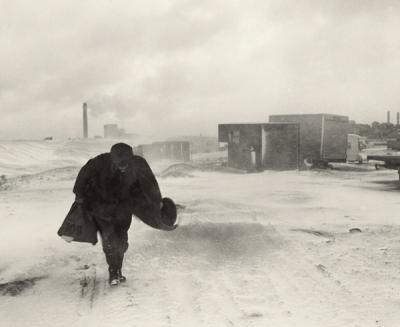
Seacoal Camp
Lynemouth, Northumberland
Chris Killip
1985
_______________________
Art Without Relations
Graham Harman
ArtReview
(....)
Relationality has long had a good press well beyond the arts. Widespread sympathy for dynamic relations over dreary substances marks the general intellectual mood of our time. In recent Continental philosophy, figures from Jacques Derrida and Gilles Deleuze to Isabelle Stengers, Bruno Latour and Jane Bennett are all cited as admirable champions of process and relation over static autonomous things. Yet the claim of object-oriented philosophy, which I advocate, is that the primacy of relations over things is no longer a liberating idea (since it reduces things to their pragmatic impact on humans and on each other).
(....)
... for the arts, as for the social sciences, the greater danger is the upward reduction that paraphrases objects in terms of their effects rather than their parts. For it is dubious to claim that objects are utterly defined by their context, without any unexpressed private surplus. To defend this view is to commit oneself to a world in which everything is already all that it can be. Change would be impossible if this melon, that city or I myself were nothing more than our current relations with everything else.
The two reductions differ only in the direction in which they propose to destroy objects: pulverising them into sawdust, or elevating them into an all-devouring context. Admittedly, these are the two basic kinds of knowledge about what something is: either we explain what something is made of, or we describe its effects. But philosophy was never meant to be a form of knowledge. The Greek word philosophia, which means love of wisdom rather than wisdom itself, incorporates a basic ignorance into its etymology.
...(more)
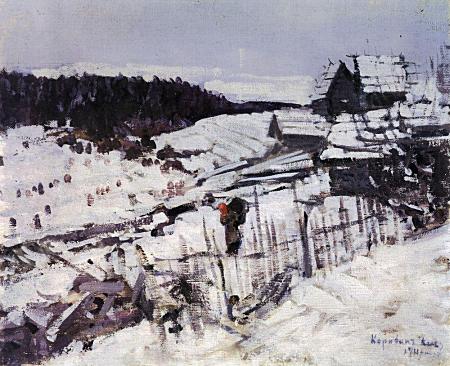
Konstantin Korovin
1861 - 1939
_______________________
The Weather Within
Theodore Enslin
d. November 21, 2011
In Memory In Homage
George Oppen
1908-1984
(....)
[]
There is no story worth
the telling of a story
no thing we can know
more than the weight of water
that passes by its depth
either a river or the rain
driving in on a storm
all wind that carries.
It is myself that rages
out of a fury just and unjust.
(....)
[]
A fire of small things
opens in the wind
there are spaces hot
but without color or substance.
They point the way
within to where small things
were greater
-early-
before the fire swept them up.
(....)
[]
What may be sung well sung
may well be sung it is
that pitiless singing changes
as the bells insist their tones
again the ringing in stages
many stages one after another
ways in or out down corridors
long stopped with dust the
velvet of neglect done
well done may well be done.
[]
Voyage loneliness unfinished
therefore lonely? no way to
put it other than the chance
words of loneliness voyage
whatever the voyage may be
or wherever we looked
any of us
tending fires in the galleys
where we'd cook whatever food
would sustain us
through that loneliness.
A fire even to cook at sea
is hazardous business but
necessary and loneliness
yes.
(....)
[]
The mind in age ascends
hovers cannot come down.
There is 'nowhere to return.'
The turns are silent wheeling shadows
high above the landscape all that
bewildered us in scale
but so far off it does no good
to know that. I suppose
it is the human condition that its parts
come together only at that place
where the fit is powerless a
design perfect in its just repose.
...(more)
_______________________
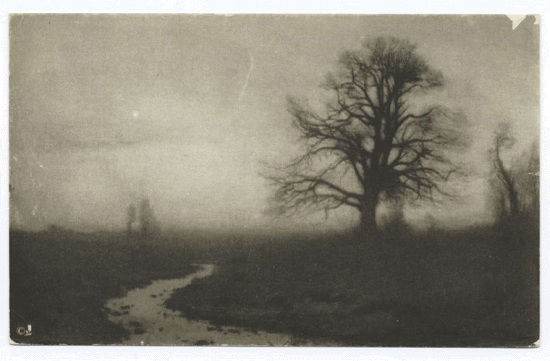
Evening
1905-1915
Charles H. Davis
Detroit Publishing Company postcards
_______________________
Maverick translation
John Felstiner
jacket2
(....)
A Stanford event asked me to translate an ancient Hebrew epigram into English…: “The broadest land’s too tight to squeeze / To give two foes an ample space, / Just as a very narrow place / Can hold a thousand friends with ease.”
Yves Bonnefoy’s Ce qui alarma Paul Celan translates to “Why Paul Celan Took Alarm” when one can learn his eloquent syntax of phases, layers, inversions, delays.
Caminante, no hay camino, / se hace camino al andar.
Clearly this holds for blazing a trail and bushwhacking and walking cross-country: where there’s no given path, you make your own way. Whether it holds for poetry, for translation, for life itself — we’ll see as we go. Antonio Machado having had his say, we’re bound to bring these lines into decent English or else learn Spanish, or marry a native speaker, or settle in Spain or Latin America.
Deeper than the eye, the ear senses rhythmic repetition: Caminante … camino … camino. But Caminante (walker) and camino (road, way) don’t seem to yield cognate terms in English, if that’s of the essence here. To begin with, then:
Walker, there is no way,
A way is made by/in walking.
“Walker … way” turning round to “way … walking” provides a telling bonus, a balancing of thought. Yet doesn’t that doubled “walk” miss the point? Since the walker’s already walking, a way must be made by something else. “Traveler, there is no trail …”? No, camino’s not “trail.” “Pathfinder, there is no path …” Interesting, but pathfinders already do more than just walk, and they’re mostly lost to us now, with their leather stockings.
...(more)
_______________________
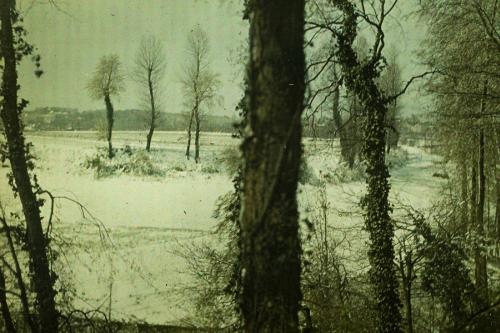
Landscape in snow
c.1910
Léon Herlant
Belgian Autochromists
_______________________
on the romantic absolute
Dalia Nassar
Interview by Richard Marshall
3:am
Dalia Nassar is a double shot of Glenmorangie on a wintry night as she goes to the depths of German Romanticism. She thinks all the time about the key idea of Kantian critical Idealism,thinks it’s best to think of Romanticism as connecting metaphysical and epistemic questions, about the Jena Romantics Novalis, Schlegel and Schelling, about the relationship between Romanticism and Idealism, about Romanticism and nature, about why she disagrees with Manfred Frank’s reading of the Romantics’ relationship with Idealism, about why she disagrees with Frederick Beiser on seeing Schelling as the culmination of Romanticism, about Romanticism and the claim it rejected systems and about why we should heed the philosophers. Those two guys in the dark, wolves howling, looking at the moon, they’d be fine if they were drinking in this …
...(more)
_______________________
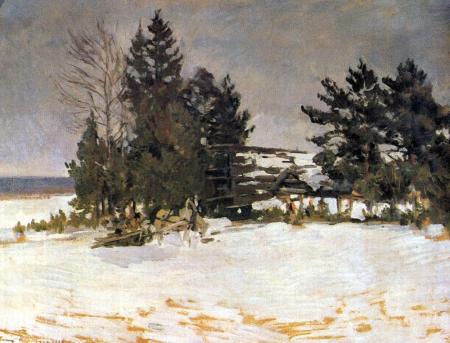
Konstantin Korovin
_______________________
Whitewashing Imperialism
Emanuel Stoakes
jacobin
(....)
Such amnesia does not occur in a vacuum; rather, it is the product of structural pressures within the media industry, the causes of which have been the subject of libraries of scholarship. In short, the editorial criteria for selecting content is driven by market imperatives rather than the public interest. Owing to the primacy of such considerations, stories deemed to have a low marketability value — or some related demerit — are relegated to the sidelines.
In practice, this often means whitewashing or ignoring the crimes of American imperialism.
(....)
Given its record in the subcontinent, it should go without saying that the United States’ self-professed commitment to human rights cannot be taken seriously, absent a sea change. From the time of the Monroe Doctrine, the US has arrogated to itself the power to dictate the affairs of Latin American countries. In the ensuing two centuries, its imperial ambitions have only increased. Throughout, the media has generally played the role of implicit accomplice, by turns a stenographer and bowdlerizer.
...(more)
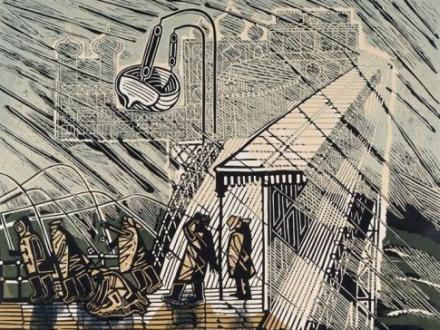
Snowstorm at Brighton
1957
Edward Bawden
d. November 21, 1989 Edward Bawden at Bibliodyssey
_______________________
Paying Attention in an Age of Distraction: On Yves Citton's Pour Une Écologie de l'Attention
Unemployed Negativity
... we are living through a profound mutation in the nature of attention, never have we had so many distractions or devices soliciting our attention. What remains in question is first whether or not this transformation is best of all understood as a new economy of attention? Terms such as "paying," "cost," and "investment" regularly suggest themselves when it comes to discussing attention. Attention appears as a scarce resource and it is quite easy to speak of losses and gains when it comes to attention, as every moment spent reading tweets is not spent reading books. The more important question is whether or not attention can be understood as an economy of sorts, but whether we have entered a new phase of capitalism in which attention itself is productive of value. Metaphor meets mode of production.
(....)
Attention cannot made to function like labor, it cannot be the source of value. This is not to say that attention is without its economic effects. The standardization of attention, its abstraction and measure, on one hand, and the battle over what one pays attention to, on the other, are central struggles to extract wealth from the flows of attention. Two strategies of the "vectorial class"are to own the icons and images the attract attention as well as the platforms that measure and standardize it. With respect to the former, Disney's buying of Marvel and Star Wars is nothing other than a kind of primitive accumulation of attention, every superhero is a vast mine of nostalgia; while facebook and Google's attempt to insert themselves as the interface for everything from research an essay to sharing pictures of grandkids can be considered the real subsumption of attention. As with Marx's real subsumption of capital, such institutions do not just effect the form of attention, focusing as its medium, but transform its very relations. The "like" button compresses so many responses, love, friendship, support, into an easily quantifiable data point.
Citton's ecology of attention is constructed around a broader set of concerns regarding activity and passivity in attention. As Citton argues the question is how to make attention not how to pay it. How to construct the possible conditions that make our attention our activity rather than the passive construction of the effects of others? The question is ultimately more spinozist, it is a question of constructing common notions against the singular points of wonder and fascination. As Citton argues, work, entertainment, and social life converge in a state of constant semi-attentiveness. Updates and alerts define our work life, social life, and define what remains of politics. Transforming this constant distraction requires the cultivation of new habits and the transformative use of the existing technologies of attention.
...(more)
via Synthetic_zero
_______________________
The City
Helwig Brunner
translated by Monika Zobel
The city simplified to lines,
makeup removed from your face.
Houses, footsteps, and thoughts
are made of the same material,
graphite dust and diamonds.
Time stalls, lowers your lids,
to be now for once in the midst of
a sleeping world, clear-sighted
turned toward the groping questions
of the somnambulists.
Four Way Review Issue #3
_______________________
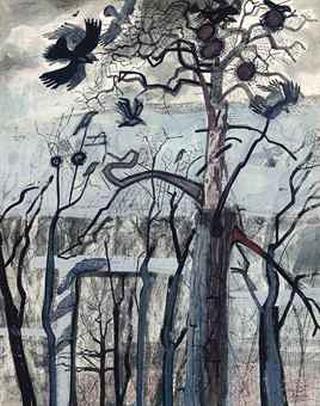
Rookery
Edward Bawden
1954 _______________________
Tree Encyclopedia by O. G ham
Monica Datta
conjunctions
Oliver’s father, before he left, said the old books were scrawled in ink on birch from Kashmir long ago, crumpled to dust. When the frost coated the birch branches Oliver picked them up, coating his hands in a glassy silver crust. Birches dotted the coast and moorland, coddled in icy hungry lichens.
They were up from London to help with the shaving. On Sundays Oliver brought the soft brush—ivory, his brother Philip horror-whispered—and a bowl of foam. His mother gave his grandfather a beard and ran the blade swish about the planes of his face, scraping dark peat and smoothing the skin with a damp towel.
He was as tall as a blunt nub on the birch bark, a ripple made large. Oliver placed the razor at the end of a paper curling, and stripped paint curls to his feet till he laid bare muscled striations of wood and gasped. He pocketed the scraping and removed the flesh around the pencil so he could rasp the lead against the page of his notebook, which said: Oliver Graham, eight, Leith, Edinburgh, Lothian, Scotland, United Kingdom, Planet Earth, heaps of freckles.
At home he lined up the tip of his thumb with the base of the left doorway and flicked a red marble down the way to knock out the bit of wall that covered the mouse hole, which now cradled the bark, blade, and paper in a handkerchief.
...(more)
_______________________
Pierre Joris: from Justifying the Margins:
“Nimrod in Hell” with a note & reminiscence on Joris même
(....)
Poet, translator: même combat! We keep hunting among stones, Dante hunts down language in the De Vulgari Eloquentia where he tells us: “let us hunt after a more fitting language…so that our hunt may have a practicable path, let’s first cast the tangled bushes & brambles out of the wood.” (Ronald Duncan’s translation, modified). But the selva will always be oscura, mutters Rimbaud in the Ardennes, stumbling through Hubert’s hunting grounds, escaping mother and her tongue (is that why he gives up writing poetry?) and he stubs a toe, goes to Africa, travels the desert, the open space, no selva oscura, no guide needed, he has learned the languages, this nomad poet who knew that “living in the same place [he] would always find wretched,” to go on trafficking in the unknown, master of “la chasse spirituelle,” a hunt that will not let up.
...(more)
_______________________
The ontology reflected in the referential terms of natural language is a richer ontology than the ontology most philosophers and in fact 'ordinary people' are willing to accept.
parts, wholes, abstracts, tropes and ontology
Friederike Moltmann interview by Richard Marshall 3a.m.
Friederike Moltmann is the Aberlour of philosophical linguistic interface. Her thoughts continually burn bright as she contemplates whether language really does carve nature at the joints, broods on descriptive, revisionary, shallow and fundamental metaphysics, on mereology and why extensional mereology won’t do, on the role of integrated wholes, on what reference situations take care of, on why natural language doesn’t allow abstract objects in its core and thinking it does is a result of naïve analysis, on the surprising ontology of natural language, on trope ontologies and on why systematic application of linguistic methodology can have serious philosophical consequences. The wind howls and the rain batters against the windows but these thoughts pour out like a different kind of storm…
...(more)
_______________________
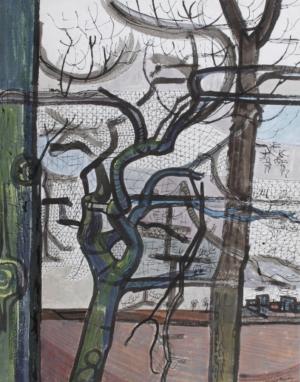
Edward Bawden
_______________________
I wanted
Helwig Brunner
translation by Monika Zobel
I wanted to live among more eloquent tongues,
below skies that didn’t collapse mercilessly into emptiness.
One morning on the sidewalk a lens from a pair of glasses—
out of its frame—glared up at me, brought me into sharp
focus for the optic nerve of an absent person and passed
the image on towards the center of the earth. "But whosoever
shall zoom in into my interior shall fall through pixilated
clouds of an unredeemable I.” I continued on, entered
a house, remained here for a while, pressed my fingers
on square keys with strange symbols. Could be, I wrote,
we’ll meet in the wrong eon in the blue of a false planet,
could be that what we're looking for with our eyes closed
is not here. Later I googled the bony world of positivism
and assured myself of your unproven love.
no man's land # 8 Winter 2013
Five Poems by Helwig Brunner
translated by Monika Zobel the adirondack review
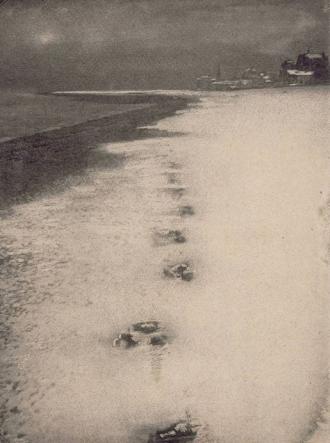
Paysage
1904
Robert Demachy
1859 - 1936
_______________________
Skull of a Curlew
Theo Dorgan
Skull of a curlew full of stars,
my mouth on fire with black, unspeakable bees.
Light on the lime boles, bleached and bare,
my gorge rising, crammed with blackfurred bees.
Clay of the orchard on my cheek,
cheeks puffed like wind on a map’s margin.
Dust in each lungful of cold air,
lips burned on the inside by black bees.
I wait for the moon to rise me
I pray to the midnight ant
I clutch at fistfuls of wet grass
I hammer the earth with bare heels.
Skull of a curlew full of stars,
night sky dredged with the eyes of bees.
Black fire around each star,
I swallow fear in mouthfuls of fur and wing.
Skull of a curlew full of stars,
the great hive of heaven heavy around me.
I spit out bees and black anger,
mouth of a curlew, fountain of quiet stars.
Theo Dorgan, from: What This Earth Cost Us
.....................................................
On the voyage of life, all that finally matters is ‘fellow-ship’
Nine Bright Shiners, Theo Dorgan
reviewed by Thomas McCarthy
(....)
There is a strong political sense in these poems that the poor shall inherit the Earth and that poets, somehow, will one day own all the means of production. Dorgan’s is a generation of intellectuals radicalised by Herbert Marcuse and Jean Paul Sartre, illuminated by Costa Gavras and bewitched by Pablo Neruda and Gabriel Garcia Marquez. Newer generations of Irish writers, those reared in a private, ironic world (so private that they are outraged by the free gift of a U2 album) could never understand the massive optimism contained within Dorgan’s unbroken sense of community. Such a belief in political community is, in a very real sense, an affront to the modern.
Frankly, my modern dears, Dorgan does not give a damn:
‘I saw his last matches for the Glen, the young bucks already impatient to sweep him to the heavens where blood and raw knuckles, mud and defeat or victory would fade into remembered youth
A child myself, I sensed their insensate cruelty, the watchful precise impatience of the young.’
The poem here is ‘Learning My Father’s Memories’ and the remembrance is of Christy Ring, the greatest hurler of them all, it could be said, who when he rose to catch a sliotar was pushed sky high by several adoring townlands, from Cloyne to Blackpool. It is that sense of community that Dorgan captures to describe and praise life.
...(more)
Theo Dorgan
at Poetry International
_______________________
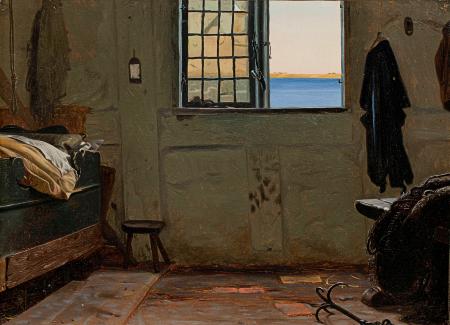
A Fisherman’s Bedroom
1853
Christen Dalsgaard
1824 - 1907
_______________________
Speculative Anarchism
arranjames
Attempts At Living
(....)
Many anarchists have engaged with continental philosophy only begrudgingly or not at all. The epithets of idealism, self-importance, separation from everyday concerns, and theoretical self-indulgence, as well as a certain stale boredom, haven’t gone unanswered by certain circles of philosophers, anthropologists and sociologists.
The speculative turn towards materialism and realism offer an opportunity for anarchism to re-engage with a different kind of philosophy.
(....)
The term ‘speculative turn’ may be getting old fashioned already by this point, just as the names that preceded it (“speculative realism”, “object-oriented philosophy”, “the new materialisms”) have also begun to undergo mutations, modifications, disappearances. Some of these authors are now speaking of ‘machines’ instead of objects, of posthuman life, or may be more readily understood as weird nihilists or accelerationists.
I don’t pretend that I have a comprehensive understanding of the various strands of the new materialist and realist orientations, and I don’t want to act as guide or (even less) teacher.
That said I have decided to assemble a list of books that a speculative anarchism reading group could consider looking at. ...(more)
_______________________
Robert Genter and Splitting Modernism
Andrew Hartman reviewing Late Modernism: Art, Culture, and Politics in Cold War America
(....)
So what does it mean that we are all neo-pragmatists? How can we understand the strengths and weaknesses of our work when we’re all more or less working from the same epistemological vantage point? Alasdair MacIntyre insists that we must learn from pre-modern traditions that enable “us to overcome the constraints on self-knowledge that modernity… imposes.” Is this even possible? What other possibilities for self-knowledge are open to us? Or is it pragmatism all the way down?
...(more)
_______________________
Slavoj Zizek: Spirit as the Wound of Nature
S.C. Hickman quotes from Absolute Recoil: Towards A New Foundation Of Dialectical Materialism
Dark Ecologies
Spirit is itself the wound it tries to heal, that is, the wound is self-inflicted. “Spirit” at its most elementary is the “wound” of nature. The subject is the immense— absolute— power of negativity, the power of introducing a gap or cut into the given – immediate substantial unity, the power of differentiating , of “abstracting,” of tearing apart and treating as self-standing what in reality is part of an organic unity. This is why the notion of the “self-alienation” of Spirit is more paradoxical than it may appear: it should be read together with Hegel’s assertion of the thoroughly non-substantial character of Spirit: there is no res cogitans, no thing which also thinks, Spirit is nothing but the process of overcoming natural immediacy, of the cultivation of this immediacy, of withdrawing -into-itself or “taking off” from it, of— why not?— alienating itself from it. The paradox is thus that there is no Self that precedes the Spirit’s “self-alienation”: the very process of alienation generates the “Self” from which Spirit is alienated and to which it then returns. ...(more)
_______________________
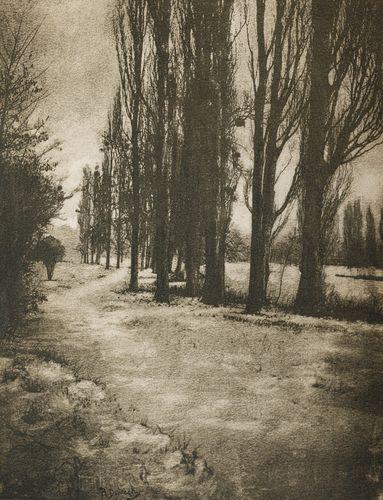
Robert Demachy
1896
_______________________
Special Feature on Kenneth Irby
(b. November 18, 1936)
Jacket2
This feature devoted to the work of Kenneth Irby collects a number of papers delivered at the 2011 colloquium devoted to Irby in Lawrence, Kansas, along with new essays by Robert Bertholf, Dale Smith, Matthew Hofer, and others; a chronology, a poem by Nathaniel Tarn, some uncollected Irby poems, a selection of letters between Irby and Ed Dorn, and a cluster of former student musings; and sound recordings from the Lawrence symposium, including readings by Irby.
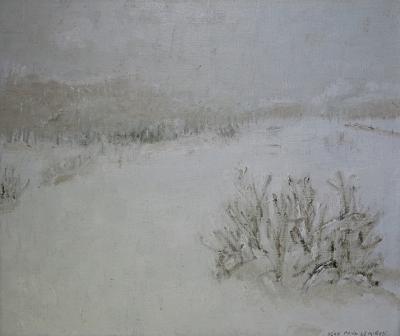
Jean Paul Lemieux
b. November 18, 1904
_______________________
Nineteen Poems
Edited by Ken Irby
jacket2
Exile Scene
for Ed Dorn
Ken Irby
The space out of the river lands I saw
spread, go on to you
still now, I left before
they had gone there, I turned at Burley
along the river’s meadows out of sight of
the starch plants, I knew you lived
way past.
And look to now. This sight
in sight out a window at a snow
lighting on the yard and truck yard next door
goes on to you. What is any friend-
ship for
is given.
Worth or not worth it, hope
gives on this snow
somehow
falls to you
warmly. Open o open
up our moments
The highways another summer go over
the inches unfrozen under the wet snowed ground
fallen on now —
Massachusetts slums muddy and snow on gone
to Kansas grasses
plait, winds home to
like pigeons
to Idaho
I know is there only
you are.
Lacking out of
wrapped in
land wrapped in this snow.
— 19 Feb [1963, Cambridge, MA]
...(more)
Kenneth Irby at EPC and PennSound
_______________________
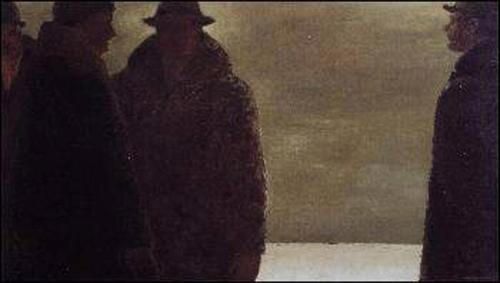
La Conversation
Jean Paul Lemieux
1968
_______________________
A Poetics of Radical Evil
Vanessa Place
lana turner
(....)
So to be reiterative and reductive: the langpo-tinctured discursive venture is not a poetics of pure indeterminacy, but of pure contingency, and in this sense, of failure. Failure to communicate, which is the fundamental condition of language itself, and the place where the categorical imperative—act as if communication is possible, and communication is possible—serves as maxim for most standard poetics and traditional criticism.
(....)
... there must be an excavation, necessarily wrenching, in addition to a radical archiving, necessarily annoying. In other words, it is not enough to walk down the Department hall, or cross a theoretical divide that is not a divide, at least not in practice. There is no art without theory, no theory without art, there is the art of theory, and it is just as impure as any theory of art. It is time to rescind all licenses and make things truly free. Which, though it sounds like a sweet liberatory call, something that ought to be issued by one with some modicum of utopianism, or at least the itch for something better than this, is more a statement of fact, designed to prod us along into the future anterior, that conditional to-be. In other words, a violent and manacled responsibility, even duty. To what? To insist that poetry is what poetry isn’t.
(....)
An a-poetics is not concerned with the lack of aesthetic or ethical good, as in insufficient quality/quantity, for that is institutional critique of the dialogic variety, one that hopes that widening the terms of the dialogue will produce more poetic goods—the subjective and objective imperatives will happily coincide. An a-poetics rather insists that, to use another numerical referent, the trinity is the new binary, and there is no dialogue, no call and response because the poem is no longer treated as a text to be read, however many ways and loose, but is cut loose altogether. The poem is simply a site of potential engagement like other works of art are simply sites for potential engagement, and there may be no “reading” just as there may be no “writing,” but a tripartite encounter with a textual surface. An encounter effected by what I have called a “sobject,” an entity that is neither subject nor object but anthropomorphic soup, spatio-temporally seasoned.
...(more)
_______________________
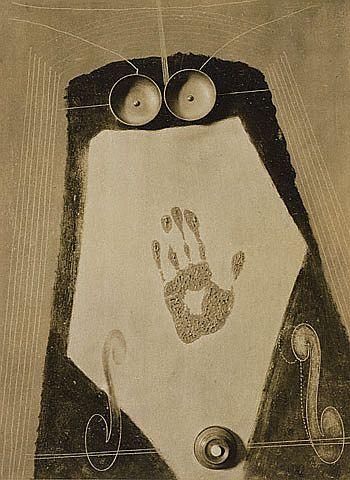
Self-Portrait Assemblage
1916
Man Ray
d. November 18, 1976
_______________________
Deconstruction and Non-Philosophy [pdf]
François Laruelle
Translated by Nicholas Hauck
(....)
5.2 Non-philosophy does not emphasize otherness or differences; it does not compound them through différance, and does not content itself with establishing play while conserving the deconstructionist's ex machina authority (which amounts to the same thing as enclosure). It does not add to nor subract from the immanent deconstruction of the thing (of texts); rather, it substitures unilateralism for difference (différance), the structure of the immanent existing-Stranger for differing, and it breaksthe enclosure, at least for the Real. If in the best of philosophical cases there is pure difference - a signifier in contrast to nothing, not even another signifier nor one that is absolutely removed from the chain, a "Greco-Judaic" signifier we could say - then there is a pure otherness that delimits, not in opposition to immanence (which has no limit), but a One-limitation that is opposed to the system as its possibilizing impossibility.
(....)
via synthetic-zero
_______________________
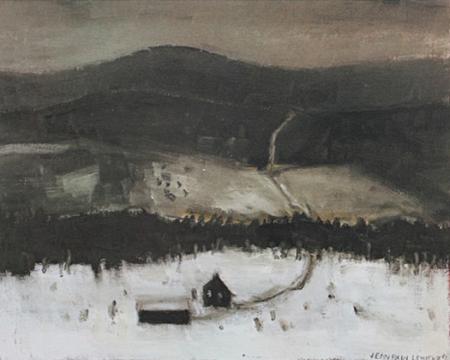
La Maison des Chapdelaine
Jean Paul Lemieux
_______________________
America's Dangerous Pipelines
With Senate Poised to Vote on Keystone XL, New Analysis Reveals Dangerous Toll of U.S. Pipelines
WASHINGTON - With the U.S. Senate poised to vote on the Keystone XL pipeline on Tuesday, a new analysis of federal records reveals the dangerous toll of pipelines in the United States. In just the past year and four months, there have been 372 oil and gas pipeline leaks, spills and other incidents, leading to 20 deaths, 117 injuries and more than $256 million in damages.
The new data adds to a June 1, 2013 independent analysis of federal records revealing that since 1986, oil and gas pipeline incidents have resulted in 532 deaths, more than 2,400 injuries and more than $7.5 billion in damages.
...(more)
Center for Biological Diversity
_______________________
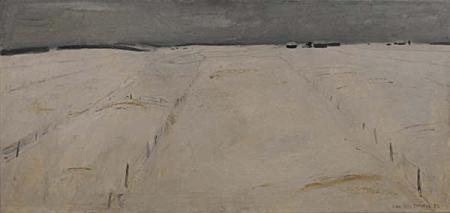
Jean Paul Lemieux
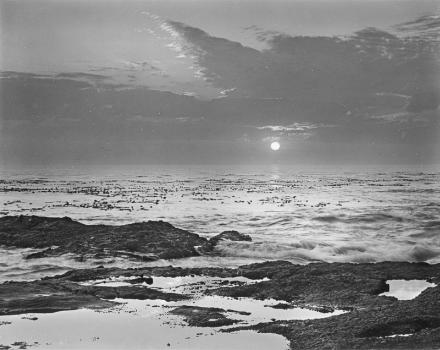
sunset
Big Sur country
1957
Wynn Bullock
d. November 16, 1975
1 2
_______________________
Autumn’s child
Bo Carpelan
Translated by David McDuff
books from Finland
When I took my first walk here in Udda, along the road down to the end of the bay, my legs wanted to go left up to the forest, while I strove to walk straight ahead. It was an unsteadiness reminiscent of being slightly drunk. A slight vertigo I have already noticed before. Trees soughed through me and the water of the bay tasted almost like salt on my lips. All sorts of things try to pass straight through me nowadays. I am becoming a general store. The few people I know go there and choose, and I try to sell. Most of it is old memories with attendant dust. They are in no chronological order at all, and make involuntary, rapid leaps, like kangaroos. Even when I went to school they hopped around. They forced me to learn my lessons by heart. They continued to skip over me at university and added an extra complexity to my studies in general history: concentrate of reign lengths.
And if I followed my legs and gave not a damn about my dead straight road? Digressions from what was planned provided me later on with my best experiences, and coincidences were grains of gold. Improvisations were lucky throws, or disasters. Afterwards came the restrictions, the constructions, the architecture. Now only that squared-paper notebook remains with its pitfalls. The uncertainty is sometimes imperceptible, but is there: Am I not superfluous? Are not my legs somewhat irrational?
Entangled in such questions, as in a magpie’s nest or in Kafka’s Odradek, I go forward, a dry leaf among a large number of other dry leaves. ...(more)
_______________________
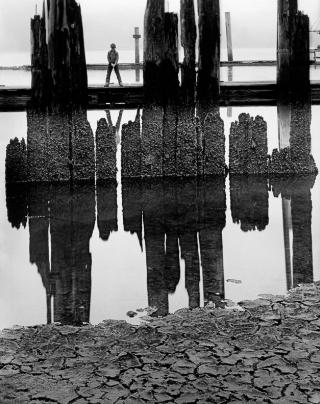
boy fishing
Wynn Bullock
1959
_______________________
Life is a small space now, much more intimate. I'm not out there in the world anymore, but I'm watching.
Robert Wyatt interviewedPitchfork
(....)
It may be an English thing, in a way, laughing it off at a distance and using that as self-protection. I mean, I don't want to be a professional cripple. And I don't see the suicide stuff as tragic. Basically, at that age, I looked at what adults were doing and how they wanted to earn money, and I really didn't want to do that. I wanted to go away. I have my moods like that a lot. I'm not a fighter in that sense at all.
I don't think losing things—in my case, the use of my legs—really damages or hurts you. What hurts people a lot is taking humiliation. A lot of the wars going on right now in the Middle East aren't about poverty and exploitation. They’re about humiliation. For a long time, certainly the British and French have been humiliating and dismissing the people of the Middle East, and encouraging people like Israel to do the same. Israel started out as a socialist state, but we always encouraged them to become rather racist and look down on the local inhabitants, which they now do. It's sad that's happened.
...(more)
via Steve Mitchelmore
_______________________
Document against loss
Carol Ciavonne
entropy
I call this Document against loss because isn’t all recording, in art or otherwise, done against the threat of loss of memory, of life? A warning and a remembrance. Would we document without the threat of loss? Our memories are a compilation of losses, some beautiful, some devastating; the very condition of being human is living in loss. This is why we try to keep and curate and tenderly preserve what we see and hear, what we are about to lose, whether through distance or time or devastation. What we choose to keep by recording makes it somehow possible that we can ward off our loss, or momentarily believable that there has been no loss, or to feel we can change conditions so that there will be no loss, or that we can somehow mitigate it. So hopes and griefs are always united in the record.
_______________________
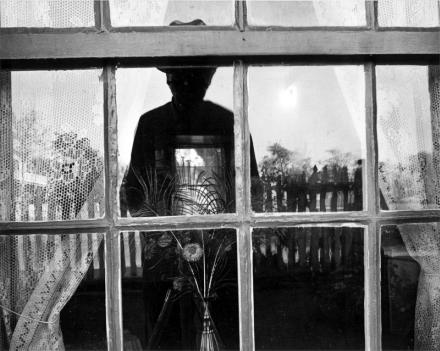
Self Portrait
Wynn Bullock
1971
_______________________
Performance, reinvention, and alternate realities
Will Oldham interviewed by Gary Canino
bomb
(....)The controlling idea, I think, is not supposed to be about the performer, but the listener. The performer is always going to dominate and control the whole experience, but as much as you drain expression out of the performance, it's still going to be completely dominated by the performer. You can get people to sand off those portions of the performance that maybe allow the individual more access and the listening experience to have more to it. If it's all about the performer's idiosyncrasies and emotions, then there is no room for the audience. Some audience members might like that kind of music, but take something hyper-emotive, like Janis Joplin, and I'll think, Ok, Janis, there is no room for me in these songs, so I'll just turn this off and listen to something else.
...(more)
_______________________
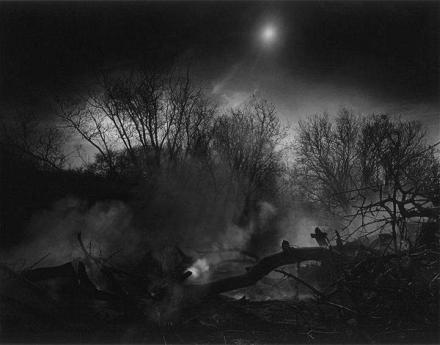
Wynn Bullock
_______________________
Notes from the Anthropocene #1
Glenn Dyer and Stephanie Wakefield
brooklyn rail
(....)
In light of the Anthropocene, geologists have also begun reshuffling their own rubrics, expanding the purview of paleontology from the organic to the inorganic and from the past to the present with the introduction of “technostratigraphy.” According to Zalasiewicz and colleagues Colin Waters (Principal Mapping Geologist at the British Geological Survey) and Mark Williams (Professor of Palaeobiology with Zalasiewicz at Leicester), technofossils may well stand as the most convincing evidence of the epoch’s environmental signature. In the first-ever instance of geoscientists using anything other than biological fossils to help classify a chronostratigraphical unit, the A.W.G. are not looking at dinosaur vertebrae frozen in amber or ancient leaf imprints found in stone, but at critical infrastructures and cities like New York itself, which they see as “one of the most extensive, durable and geologically distinctive aspects of the Anthropocene” and thus as representative index fossils of the epoch’s recent, current, and near future. Whereas palaeontology has always been about studying past geological artifacts, the objects now under consideration as Anthropocene fossils—the key evidence in the Anthropocene dossier—are those of our present-day, still-functioning civilization. Thus for the first time in history, geologists are now dating an epoch in the present tense, studying contemporary, still functioning, infrastructures as fossils, studying the constituent elements of our civilization the way they once studied the remains of a long-vanished life form.
Through their attempt at naming and measuring the epoch of man, studying cities and subways as fossils in real time, and conjuring future geologists from outer space to study a world in which this civilization has completely vanished, these geologists have called our entire civilization and its requisite way of life a ruin. It would be easy to read the “humanity” implied in the Anthropocene as the final expression of modern man’s vanity, one last Promethean blast, but doing so misses entirely what’s most decisive about the stratigraphers’ concept: the Anthropocene elevates liberal humanity to prime geohistorical agent, center of the world, but does so only in the moment of its historical collapse. Has there ever been a civilization that named itself after its most cherished principle in order to call the whole thing a failure?
...(more)
via I Cite
|
